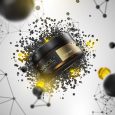Regulations of European Union are strict when it comes to matter of cosmetic production and they more and more are leaning toward consumers. Why? UE regularised regulations concerning placing on packagings, e.g. of hair conditioner, its composition. Because of that we have possibility to know many details about products by just checking informations on the packaging. What should you pay attention to when you buy hair conditioner?
 In the script of conditioner’s composition applies one simple rule. The more substance in a ready product the higher in the composition it can be found. Usually base for conditioner is water, which is in the largest amount. Because of that it is at the beginning of composition of most cosmetics. Ingredients, which are present in product in trace amounts are always at the end of composition.
In the script of conditioner’s composition applies one simple rule. The more substance in a ready product the higher in the composition it can be found. Usually base for conditioner is water, which is in the largest amount. Because of that it is at the beginning of composition of most cosmetics. Ingredients, which are present in product in trace amounts are always at the end of composition.
Being familiarised with this rule can be quite a simplification for the consumers, despite the fact that manufacturers do not have to state percentage amount of given ingredient.
ESSENTIAL WATERS INSTEAD OF WATER
It is beneficial for conditioner to have water replaced with essential waters or vegetable extracts. It is a guarantee of better quality and greater effectiveness of cosmetic. It can be camomile essential water, melissa essential water, rose essential water or other plant with properties that suit us.
ALLERGENS AT THE END
At the end of composition of each conditioner must be placed substances, which can sensitise. There are 26 sensitising substances used in cosmetics. List of all of them you can find on the Internet, but you can find there, among many: citronellol, benzyl benzoate, limonene, etc. You should avoid them or at least try to buy hair conditioners with trace amounts of them.
SUSPICIOUS SLS/SLES
Controversial ingredients of hair conditioners are Sodium Lauryl Sulfate (SLS) and Sodium Laureth Sulfate (SLES). They are most commonly used in shampoos, but they fulfil the same purpose in conditioners. They are used as foam makers. Unfortunately, the side effect of their use is very often dryness and skin irritations or even disorder in sebaceous glands work.
WE SAY NO TO SILICONES
Undeniably, silicones are foreign substances to our body, which is unable to process them. In the composition of hair conditioners silicones take high position, because are responsible for proper look of hair. There are conflicting opinions about them being harmful. As it turns out, much depends on our predisposition – for one hair conditioner with silicon can be too heavy and for other will be perfect to tame wild hair.




